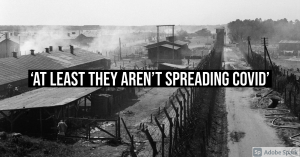The current ‘mass quarantining’ that has been advocated for in the name of ‘controlling’ the COVID pandemic has drawn attention and concern from many because of the seemingly drastic measures being taken without clear knowledge of what exactly is happening or how said measures will stop the virus from spreading and reduce deaths. In the case of Germany, as reported yesterday, there is great concern as at least three states are discussing the forced arrest and concentration of COVID quarantine violators into migrant camps. Given Germany’s history, and the potential of this act to spread disease among the migrants, it naturally is a very questionable thing.
But now the UK is proposing similar means of a comparatively drastic nature, for as Bloomberg reports by way of MSN News, the government is considering the establishment of “quarantine hotels” where people would be forcibly concentrated and ‘quarantined’ until determined to be ‘safe’ to travel.
The U.K. will step up its mass coronavirus vaccination program this week, offering shots to millions more people, as the country shuts its borders to anyone who hasn’t tested negative.
Vaccines will be offered to people aged 70 and over, and those deemed “clinically extremely vulnerable” from Monday — the third and fourth priority groups. Prime Minister Boris Johnson called it a “significant milestone” in the vaccination effort.
England Isn’t Listening to Johnson’s Lockdown Orders Any More
The government aims to offer the vaccine to all U.K. adults by September, Foreign Secretary Dominic Raab said Sunday. So far, almost 3.9 million people have received their first dose, according to the government.
Meanwhile, ministers will close travel corridors with other countries from Monday, meaning that all visitors from overseas will require a negative test result within 72 hours of travel to enter Britain. Health officials will step up checks to make sure they self-isolate at home for the next 10 days.
The government hasn’t ruled out setting up quarantine hotels or using GPS trackers to make sure people stay put. Raab told Sky News it would consider “all possibilities” to enforce Covid rules and prevent any new variants of the virus derailing the U.K.’s vaccination efforts.
Forcing travelers to stay in dedicated hotels on arrival would still put the U.K. many months behind other countries, including Australia which introduced the policy last March. (source)
One can call it a hotel or a camp. It does not matter because the concept is the same- the concentration into one spot in the name of “public safety” that comes at a clear surrender of not just civil rights, but also one’s personal dignity. This is not to say that the virus is not serious or a concern. Rather, it is to say that as I have reported before, the long-term effects of COVID and how it reshapes social norms or rather, is used to reshape social norms, will far outlive the virus itself. This is the real danger, because diseases always go away (it is never heard of that a virus stays with a people forever in the same capacity as before, for even the Black Plague went away even though it still exists) and life resumes. While emergency measures are necessary and real, there is a pattern of abusing them to get power and then keep the power instead of returning to normal as in the past, with the ‘changes’ that happened as a ‘new normal’ and justified by the events of the past but with intentionally obscuring the future effects of such a change, with is always the gain of the powerful at the loss of those under their control.
Perhaps a vaccine will help. There are truly measures such as mask wearing and social distancing that help too. However, these are supposed to be temporary, not permanent changes, to how people live. Rather, this is not happening, and instead, changes are being made increasingly with an attitude of permanence in mind. When one add to this how people seem to be increasingly guided into places of concentration in the name of a supposed ‘public good’, it is difficult seemingly to argue how this could ever end well if one looks at history as even a simple guide for the future from the past.



